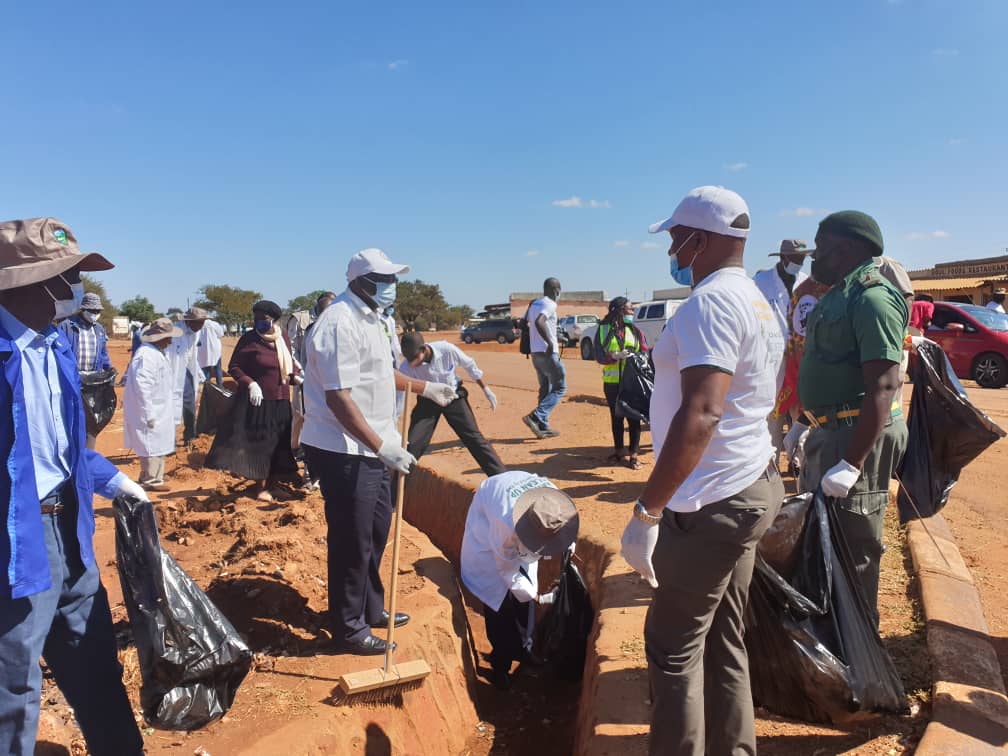|
Getting your Trinity Audio player ready…
|
Honourable Mangaliso Ndlovu, the Minister of Environment, Climate, Tourism and Hospitality Industry has made a call on communities to embrace sustainable waste management.
The call was made today at an event dubbed the “Independence clean-up day” at Mahamba Business Centre in Bubi District under the Matebeleland North Province. Under the same area, the Inyathi Centre is one of the areas where the national clean-up programme, declared by President Mnangagwa, in December 2018, has taken root.
The month of April is quite significant in the history of Zimbabweans, as the country commemorates its hard-won independence, hence the Nation has seen it apt to dedicate the whole month of April for clean-up programmes every Friday, running under the theme, ‘Together-Growing our Economy for a Prosperous, Resilient and Inclusive Society in a clean, safe and healthy environment’.
The Bubi Rural District Council has made an effort to put up a Waste Management Transfer Station at Mahamba Business Centre. However, it emerged that the station needs scaling up and protection from vandalism.
“The clean, safe and healthy environment we all want can only become possible if we all exhibit responsibility; and adopting and adapting to best practices in waste management especially in testimony to the Independence we enjoy as a country. As such, all these Friday clean-ups for the month of April were in cognisance of our hard-earned Independence, hence celebrating it in style, by ensuring that we all participate in cleaning and keeping our immediate surroundings clean,” Minister Ndlovu said.
The minister encouraged stakeholders to take the message to all parts of the country and by so doing “leave no one behind” in the sustainable management of waste. To that end, he challenged all local authorities to empower its residents in sustainable waste management by among other interventions, spearheading the formation of local level Waste Management Committees in all major centres so that cleanliness is attained in its totality.
He said Waste Management Committees are essential in mobilising communities for clean-ups, advocacy and also act as the eyes in identifying litterbugs and general monitoring. This also is in testimony that an empowered society is an able community in perpetuating the sustainable waste management agenda.
Again, this also remains key in perpetuating the global and national agenda on sustainable waste management; and in promoting national aspirations as depicted in the National Development Strategy 1 (NDS1) and Vision 2030. The minister said the beauty of community-based waste management is that it allows for communities to permeate through the whole waste management landscape and identify livelihood enhancement opportunities from the waste at their disposal, hence adopt sustainability principles and circularity in the waste material value chain.
He said it is thus the aspirations of the development agenda to see communities finding a niche in the business case provided in waste management and embarking in recycling, remaking and repurposing of waste; thus achieving zero waste in the environment and at the same time enhancing livelihoods.
“This remains a vital facet of the circular economy we all envisage and is also capable of ensuring the cleanliness of our service centres, and the environment in its entirety. I also call upon local authorities to foster linkages and collaborations with recycling companies for the collection of recyclable materials, and in so doing propel the circularity model and aid communities to eke a living from waste as they convert, “Trash to cash”.
Minister Ndlovu commended the Mahamba Business Community, vendors and members of the public for the inclusivity and unity of purpose that they exhibited by participating in this and other previous clean-up programmes. If such a mindset could be inculcated in all Zimbabweans then littering and waste dumps would be a thing of the past, the minister said.
The Bubi RDC is failing to start the process of constructing a properly engineered landfill due to challenges in securing land for that purpose. To that end, the minister called upon local authorities having the same predicament to work as a consortium with neighbouring local authorities and spare land from each of their boundary lines; and collectively embark on the landfill construction process.
Local authorities remain the biggest beneficiaries of clean-up campaigns and were urged to take a leading role in organising such events, under the guidance of the District Development Coordinators and the Environmental Management Agency (EMA). They were also encouraged to provide adequate public bins at the growth points, rural service centres and ensure that the frequency of emptying these bins promotes cleanliness. After such clean-ups, they are expected to collect all the waste and ensure its safe management for recycling and disposal. Above all, the minister said cleanliness should be upheld at all times.
The thrust of the National clean-up programme is to ensure that all Zimbabweans share the same vision and understanding that as citizens, they remain the primary beneficiaries of a clean, safe and healthy environment; hence maintaining a clean environment remains the best option.
Minister Ndlovu urged all stakeholders doing business at rural service centres to stand up and be counted in waste management. Those in mining and the business community alike were encouraged to donate towards solid waste management in the form of bins and cleaning materials, as well as adopting areas for maintenance and thus enhance a litter-free environment.
